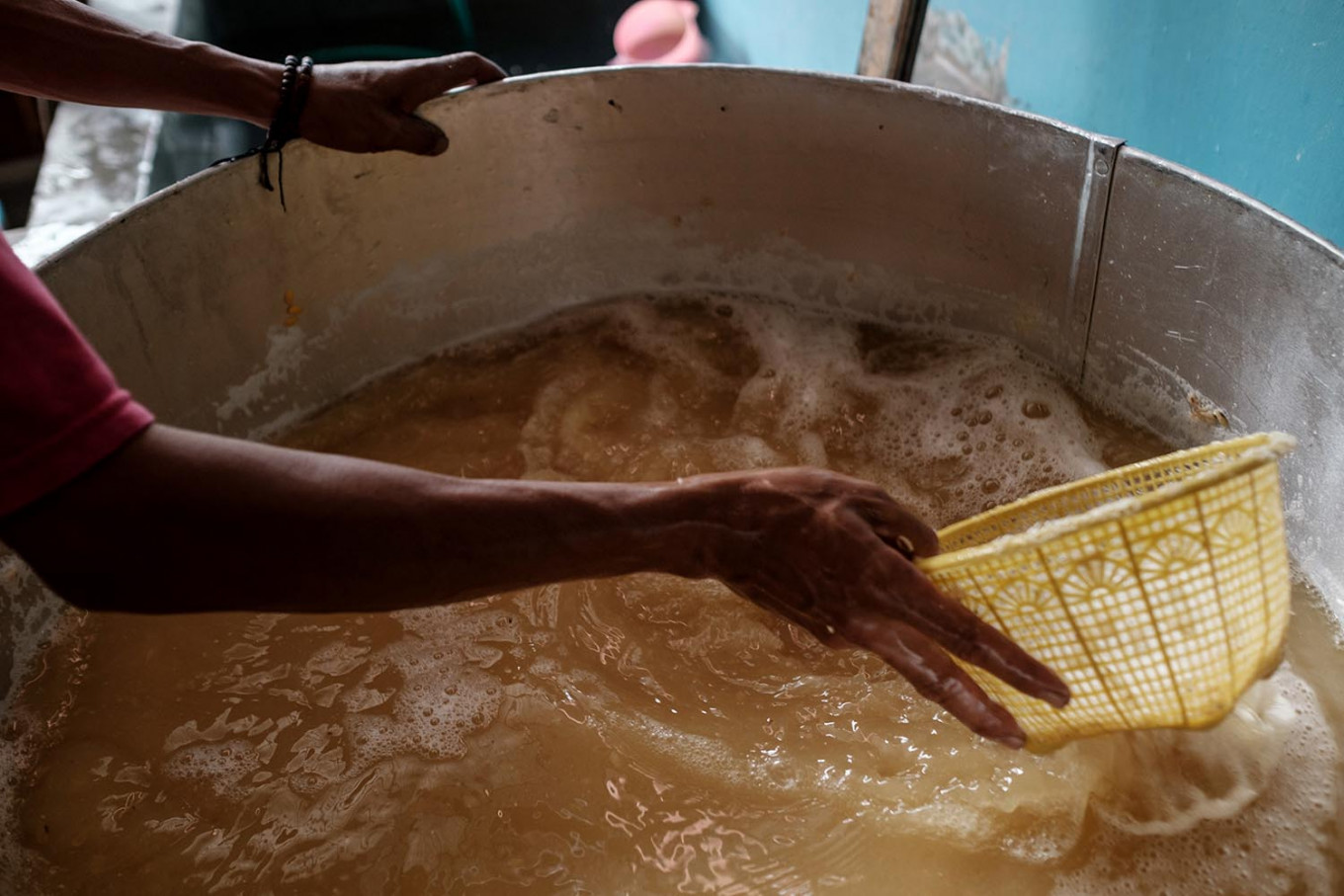Popular Reads
Top Results
Can't find what you're looking for?
View all search resultsPopular Reads
Top Results
Can't find what you're looking for?
View all search resultsSoybean price hike hurts entire supply chains
Change text size
Gift Premium Articles
to Anyone
T
he surging soybean price is taking a toll on supply chains in Indonesia’s food and beverage industry amid the country’s heavy reliance on imported soybeans.
The price of imported soybean hit US$16.75 per bushel on Thursday, up 17.6 percent from last year, and just above the last peak, which was in May 2021, Business Insider data show.
Tofu and tempeh producers have been hurt the most by the hike. The government estimates that 90 percent of the country’s soybean goes into those two staples of national cuisine.
Imported soybean is currently sold at Rp 13,300 (92 US cents) per kilogram in the domestic market, 15.65 percent higher than a year earlier, Trade Ministry data show. Before the pandemic, producers were used to buying the ingredient at around Rp 8,000 per kg.
Many tofu and tempeh producers in Java halted production last week amid high costs and low margins, causing a scarcity in the market and affecting many businesses.
Read also: Tofu, tempeh producers go on strike over high soybean prices
The global soybean price hike adds to imported inflation in Indonesia. Indonesia sources some 90 percent of the commodity from producers in the United States, who have increased prices in response to rising production costs and high demand from China.
Harvests in other top soybeans exporters Brazil and Argentina have been diminished by bad weather.
Mukroni, who chairs a cooperative of Indonesian warung (food stalls) with more than 10,000 members, said tofu and tempeh dishes together accounted for at least 20 percent of daily sales.
Warung owners have been reluctant to raise prices, as most of their customers were low-income consumers, many of whom had experienced financial strain in the pandemic-ravaged economy.
Stalls that still had tofu and tempeh on the menu had reduced the portions, Mukroni told The Jakarta Post on Thursday, adding: “If we sold [tofu and tempeh] at higher prices, there would be no customers.”
Indonesian Micro, Small and Medium Enterprises Association (Akumindo) chairman Ikhsan Ingratubun said on Thursday that tofu and tempeh were widely used by street vendors for fried food and snacks and that small businesses were losing sales due to the increased price of their products.
Meanwhile, Indonesian Market Traders Association (IKAPPI) chairman Abdullah Mansuri said on Thursday that many traditional market vendors were unable to source raw tofu and tempeh, as many producers had suspended operations.
“Tofu and tempeh vendors have suffered quite a drop in sales. They are [struggling], because they sold nothing,” Mansuri told the Post, explaining that many vendors had specialized on selling only those two products.
Indonesian Food and Beverage Industry Association chairman Adhi Lukman said on Thursday that big companies, too, were under financial strain from high soybean prices, while many other ingredients – like sugar, vegetable oil and food coloring – had also surged in price. He said imported inflation had already arrived in Indonesia.
Citing Food and Agriculture Organization (FAO) reports, Adhi said there had been an average 33 percent increase in food commodity prices last year and almost a doubling for soybeans.
“To be honest, we have restrained ourselves from raising prices in 2020 and 2021 by slashing our margins, but with these significant hikes, like it or not, we will raise prices in 2022,” Adhi told the Post.
The Agriculture Ministry said on Friday it was encouraging farmers to plant soybean and was aiming for soybean to be cultivated on an additional 52,000 hectares in 2022.
The ministry plans to ensure the availability of seeds and involve companies as off-takers, so as to help soybean farmers get loans by making their business more bankable.
“We hope to increase [soybean] production,” Yuris Tiyanto, director of assorted nuts and bulbs at the Agriculture Ministry, said in a statement.
Meanwhile, the Trade Ministry has been mulling over several options, including subsidies and reference prices, to stabilize the imported soybean price, but it had yet to make a decision, hence leaving the price up to market forces for now.
Read also: How to escape from the soybean import trap
Indonesian Political Economic Association (AEPI) agriculture expert Khudori claimed on Thursday that the current crisis could have been averted if the government had exercised more control over the market.
He suggested the government reinstate a neglected program for self-sufficiency in soybean production to increase domestic output and thus reduce reliance on imports.
To achieve self-sufficiency, he said, the government would have to ensure farmers got a certain price to keep them planting soybeans even when the international market price was lower.
In 1992, he said, soybeans had been cultivated on 1.67 million ha across the country, but that had dropped to just 285,265 ha in 2019 as imported soybean dominated the market.
“Farmers are rational economic beings. If soybeans are not profitable, then don’t hope for domestic production,” he said.
He said Indonesia’s climate was not a problem for planting soybeans, pointing to the success of Brazil in developing seeds that suited a tropical climate.
As a short-term measure, he said, the government could consider a subsidy to quickly bring the price under control.










